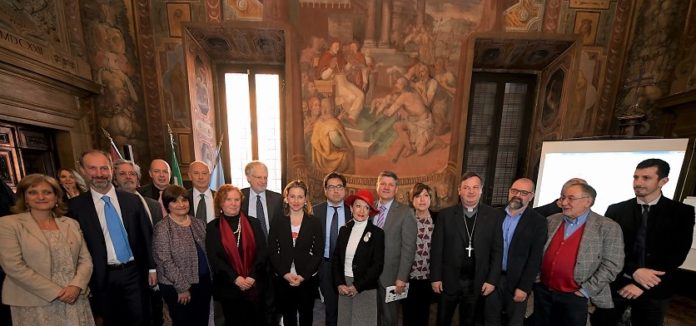Rome (NEV), February 9, 2019 – “It is important for us Protestants to have signed this ‘Interreligious Manifesto for the end of life rights’ in February, just on the eve of the feast of freedom with which we recall the acknowledgement of civil and political rights granted to the Waldensians by King Charles Albert, on 17 February 1848, 171 years ago”. With these words the president of the Federation of Protestant Churches in Italy (FCEI), pastor Luca Maria Negro, commented the event. FCEI is among the 18 signatories of the Manifesto presented on February 5th during an official ceremony at the ‘Salone del Commendatore’ in Santo Spirito in Sassia, Rome.
“As Italian Protestants we believe that freedom and responsibility are two inseparable concepts, therefore the dialogue with institutions and other confessions and religions, is a starting point not only on bioethics issues, as in this case, but also in general on more wider issues – continued Negro -. We are still waiting for a framework law on religious freedom in Italy and we think that starting from the respect of the different faiths we can give an important contribution to society”.
The Manifesto, which has seen the collaboration of Protestants, Catholics, Orthodox, Jews, Muslims, Buddhists and Hindus, defines nine fundamental rights and guarantees, in addition to care, the respect for dignity and the religious and spiritual support for those who find themselves when in the final phase of life, in health care facilities: “An important work due to a particular sensitivity towards interreligious dialogue in the health sector, aimed at creating a path that leads to concrete commitments” reads the press note issued on the occasion, which emphasizes the document represents an “the achievement of a fully shared path that makes possible the transformation of the nine rights into operational procedures”.
The religious confessions have signed the text – promoted by the Rome Interreligious Board, the health department ASL Roma 1 and the Gemelli Medical Centre (GMC), Catholic University of the Sacred Heart – during the World Week of Interfaith Harmony of the United Nations General Assembly.
The Minister of Health, Giulia Grillo, also brought her greetings during the ceremony.
To make the Manifesto operational and draw up the guidelines for the application of nutrition, spiritual care, treatment of the body during the disease and in pre and post mortem rites, an interreligious working group is operative. The FCEI’s representative in this group is Pastor Herbert Anders.





























